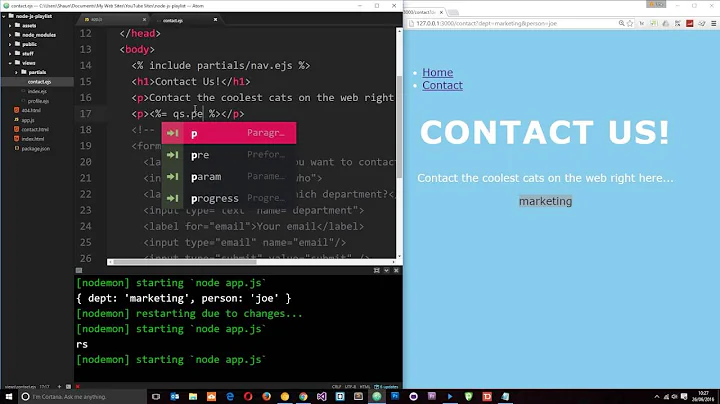Express + Node Route With Multiple Parameters in Query String
Solution 1
To use this URL in a route with Express:
/api?paramA=valueA¶mB=valueB
You do this:
router.get('/api', function(req, res) {
console.log(req.query.paramA); // valueA
console.log(req.query.paramB); // valueB
console.log(req.query.paramC); // undefined (doesn't exist)
});
Query parameters are parsed into the req.query object. If the query parameter name does not exist in the query string, then that property will not exist on the query.query object and trying to read it will return undefined. Keep in mind that all values will be strings. If you desire them to be a number or some other data type, then you have to parse them into that other type.
Solution 2
I ended up using this. This code did exactly what I set out to do in the original question.
router.get('/api', function(req, res) {
if(typeof req.query.paramA !== 'undefined' && typeof req.query.paramB !== 'undefined') {
let paramA = req.query.paramA,
paramB = req.query.paramB;
//do something with paramA and paramB
}
});
Solution 3
It`s easier to define url parameters in router .
Example url : http://www.example.com/api/users/3&0
router.get('/api/users/:id&:pending', function (req, res) {
console.log(req.params.id);
console.log(req.params.pending);
});
Solution 4
If you are certain about the GET parameters that are being passed, so you could easily do it like this:
router.get('/api', function(req, res) {
if(typeof req.params.paramA !== 'undefined' && typeof req.params.paramB !== 'undefined') {
let paramA = req.params.paramA,
paramB = req.params.paramB;
//do something with paramA and paramB
}
});
Related videos on Youtube
MadPhysicist
A technologist, a musician, an artist and a scientist.
Updated on June 04, 2022Comments
-
MadPhysicist almost 2 years
I am building an API in Node and am struggling to figure something out. Namely, I know how to build routes of the type
/api/:paramA/:paramB. In this case, there are two parameters.The code would be something like this:
router.get('/test/:paramA/:paramB', function(req, res) { res.json({ message: 'hooray! welcome to our api!' + req.params.paramA + req.params.paramB}); });How could one build a route that would respond at something like
/api?paramA=valueA¶mB=valueB? -
MadPhysicist almost 7 yearsWhat if I need to check whether both of the parameters are present?
-
MadPhysicist almost 7 yearsThat is, is this still a solid solution for that case?
-
MadPhysicist almost 7 yearsI had to do the following to get it working:
let paramA = req.param('paramA'), paramB = req.param('paramB'); -
 Gonras Karols almost 7 yearsQuoted from Express 4.x API - "req.param(name [, defaultValue]) is Deprecated. Use either req.params, req.body or req.query, as applicable. Direct access to req.body, req.params, and req.query should be favoured for clarity - unless you truly accept input from each object.."
Gonras Karols almost 7 yearsQuoted from Express 4.x API - "req.param(name [, defaultValue]) is Deprecated. Use either req.params, req.body or req.query, as applicable. Direct access to req.body, req.params, and req.query should be favoured for clarity - unless you truly accept input from each object.." -
MadPhysicist almost 7 yearsI am not sure why that happens but your version returns empty variables for me. I believe i have the latest stable Express installed.
-
 jfriend00 almost 7 yearsThis answer seems to be missing
jfriend00 almost 7 yearsThis answer seems to be missing:paramAand:paramBfrom the route definition. -
 jfriend00 almost 7 yearsI would think it should be just like the OP had it:
jfriend00 almost 7 yearsI would think it should be just like the OP had it:router.get('/test/:paramA/:paramB', function(req, res) {...}. If:paramAand:paramBare not in the route definition, thenreq.params.paramAandreq.params.paramBwill not be present. It is the route definition that causes them to get parsed and put into thereq.paramsobject. -
MadPhysicist almost 7 years@jfriend00 Yes, but I was looking to get the route of the following form:
/api?paramA=valueA¶mB=valueB -
MadPhysicist almost 7 years@jfriend00 My question asks specifically for that. Read the very last sentence :)
-
 jfriend00 almost 7 yearsThis is not the recommend way to do this.
jfriend00 almost 7 yearsThis is not the recommend way to do this.req.queryis the proper place to access parsed parameters from the query string. -
MadPhysicist almost 7 yearsYes, of course. Thanks for pointing this out! I copied the code wrong.





